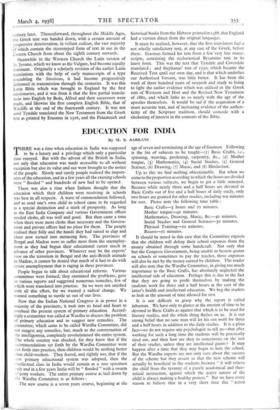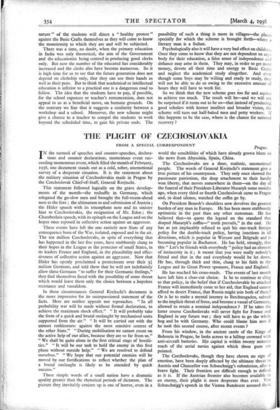EDUCATION FOR INDIA
By M. S. SARKANI
THERE was a time when education in India was supposed to be a luxury and a privilege which only a particular class enjoyed. But with the advent of the British in India, not only that education was made accessible to all without exception but also its value and use were brought to the notice of the people. Slowly and surely people realised the import- ance of the education, and in a few years all the existing schools were " flooded " and hundreds of new had to be opened.
There was also a time when Indians thought that the education which their children were receiving in schools was best in all respects. A wave of commendation followed, and to send one's own child to school came to be regarded as a special distinction and a mark of prosperity. As long as the East India Company and various Government offices needed clerks, all was well and good. But then came a time when there were more clerks than necessary and the Govern- ment and private offices had no place for them. The people realised their folly and the hands they had raised to clap and cheer now turned into menacing fists. The provinces of Bengal and Madras were to suffer most from the unemploy- ment as they had begun their educational career much in advance of other provinces. Whatever may be the experts' view on the terrorism in Bengal and the anti-British attitude in Madras, it cannot be denied that much of it had to do with severe unemployment that is raging in these provinces.
People began to talk about educational reforms. Various committees were formed, they examined the problems, gave us various reports and suggested numerous remedies, few of which were translated into practice. So we were not satisfied with all this effort, for we wanted a radical change. We wanted something to startle us out of our lives.
Now that the Indian National Congress is in power in a majority of the provinces, it took into its head and heart to overhaul the present system of primary education. Accord- ingly a committee was called at Wardha to discuss the problem of primary education and to suggest new remedies. The committee, which came to be called Wardha Committee, did not suggest any remedies, but, much to the consternation of the intelligentsia, completely revolutionised the entire system. The whole country was shocked, for they knew that if the recommendations set forth by the Wardha Committee were put forth into practice, then children would be nothing better Alan child-workers. They feared, and rightly too, that if the new primary educational system was adopted, then the intellectual class in India would remain as a rare specimen only and in a few years India will be " flooded " with a swarm (4. petty workers. The entire primary course as laid down by the Wardha Committee is as follows : The new course is a seven years course, beginning at the age of seven and terminating at the age of fourteen. Following is the list of subjects to be taught—(z) Basic Crafts, spinning, weaving, gardening, carpentry, &c., (2) Mother tongue, (3) Mathematics, (4) Social Studies, (5) General Science, (6) Drawing, (7) Music, and (8) Hindustani.
Up to this we find nothing objectionable. But when we come to the proportion according to which the hours are divided between various subjects, we begin to get a little annoyed. Because while nearly three and a half hours are devoted to Basic Crafts out of five and a half hours of daily study, only two hours are granted for other studies, including ten minutes for rest. Please note the following time table : Basic Crafts-3 hours and 20 minutes.
Mother tongue-4o minutes.
Mathematics, Drawing, Music, &c.-40 minutes. Social Studies and General Science-3o minutes. Physical Training—to minutes.
Recess—to minutes.
It should be noted in this case that the Committee expects that the children will defray their school expenses from the money obtained through some handicraft. Not only that but the Congress Government, being unable to bestow grants on schools or sometimes to pay the teacher, these expenses will also be met by the money earned by children. The reader will also note that the Wardha Committee, in giving too much importance to the Basic Crafts, has absolutely neglected the intellectual side of education. Perhaps this is due to the fact that they are going to profit themselves by making the students work for three and a half hours at the cost of the latter's health and intellectual education. We beg the readers to look at the amount of time allowed for rest.
It is not difficult to grasp why the report is called inhuman. We have only to glance at the amount of time to be devoted to Basic Crafts as against that which is to be used for literary studies, and the whole thing flashes on us. It is our strong belief that no sane man will let his son work for three and a half hours in addition to the daily studies. It is a plain fact—we do not require any psychologist to tell us—that after working for such a long time the students will be practically tired out, and then how are they to concentrate on the rest of their studies, unless they are intellectual giants ? It may happen after a time that they may begin to hate the school. But the Wardha experts are not only sure about the success of the scheme but they assure us that the new scheme will actually be beneficial to the students because " it will relieve the child from the tyranny of a purely academical and theo- retical instruction, against which the active nature of the child is always making a healthy protest." But we have every reason to believe that in a very short time this " active nature " of the students will direct a " healthy protest " against the Basic Crafts themselves as they will come to know the monstrosity to which they are and will be subjected.
There was a time, no doubt, when the primary education in India was only theoretical, the aim of the Government and the educationist being centred in producing good clerks only. But now the number of the educated has considerably increased and the clerks also have become numerous. So it is high time for us to see that the future generation does not depend on clerkship only, that they can use their hands as well as their pens. But to think that academical or intellectual education is inferior to a practical one is a dangerous road to follow. The idea that the students have to pay, if possible, for the school expenses or teacher's remuneration, does not appeal to us as a beneficial move, on humane grounds. On the contrary we fear that it suggests a similarity between a workshop and a school. Moreover, the new scheme might give a chance to a teacher to compel the students to work beyond the scheduled time, to gain his private ends. The possibility of such a thing is more in villages—the places specially for which the scheme is brought forth—where a literary man is a Sultan.
Psychologically also it will have a very bad effect on children. Once they come to know that they are not dependent on an3- body for their education, a false sense of independence and defiance may arise in them. They may, in order to get more money, devote all their time and energy to Basic Crafts and neglect the academical study altogether. And even though some boys may be willing and ready to study, they will not be able to do so owing to the excessive amount of hours they will have to work for.
So we think that the new scheme goes too far and aspires to achieve too much. The result will be—and we will not be surprised if it turns out to be so—that instead of producing good scholars with keener intellect and broader vision, the scheme will turn out half-baked men and petty workers. If this happens to be the case, where is the chance for national recovery ?







































































 Previous page
Previous page